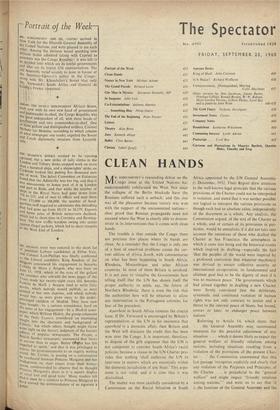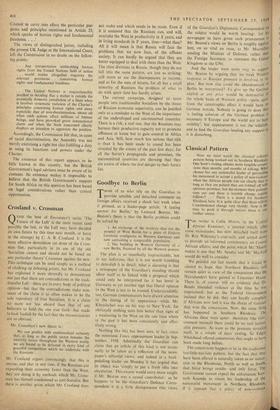CLEAN HANDS
MR. KHRUSHCHEV's resounding defeat on the Congo issue at the United Nations ha, understandably exhilarated the West. Not since the collapse of the Berlin blockade have the Russians suffered such a setback; and this one was all the pleasanter because victory was won with the support of the uncommitted nations— clear proof that Russian propaganda need not succeed where the West is clearly able to demon- strate in its interventions that it comes with clean hands.
The trouble is that outside the Congo there are precious few places where its hands are clean. As a reminder that the Congo is only one of a host of unsolved problems comes the cur- rent edition of Africa South, with commentaries on what has been happening in South Africa. Rhodesia, Mozambique and other African countries. In most of them Britain is involved. It is not easy to visualise the Government here telling itself that the UN has shown itself the proper authority to settle, say, the future of Northern Rhodesia; there is even the risk that the authorities here will be reluctant to allow any intervention in the Portuguese colonies, for fear of the precedent.
Apartheid in South Africa remains the crucial issue. If Dr. Verwoerd is encouraged by Britain's representatives at the UN in his insistence that apartheid is a domestic affair, then Britain and the West will dissipate the credit that has been
won over the Congo. It is important, therefore. to dispose of the glib argument that the UN is not competent to consider South Africa's racial policies, because a clause in the UN Charter pro- vides that nothing 'shall authorise the UN to intervene in matters which are essentially within the domestic jurisdiction of any State.' This argu- ment is not valid; and it is time that it was discredited.
The matter was most carefully considered by a Commission on the Racial Situation in South
Africa appointed by the UN General Assembly in December, 1952. Their Report drew attention to the well-known legal principle that the various provisions of the Charter could not be interpreted in isolation, and stated that it was neither possible nor logical to interpret the various provisions as though each had an absolute value, independently of the document as a whole. Any analysis, the Commission argued. of the text of the Charter as a whole, and of certain of its provisions in par- ticular, would be unrealistic if it did not take into account the intentions of those who drafted the Charter at San Francisco, the atmosphere in which it came into being and the historical events which inspired its drafting—especially the fact 'that the peoples of the world were inspired by a profound conviction that whatever machinery was devised to ensure collective security or international co-operation, its fundamental and ultimate goal had to be the dignity of man if it was to maintain peace.' The governments which had joined together in drafting a new Charter were 'firmly convinced that the deliberate, systematic and continued violation of human rights was not only contrary to justice and a threat to the internal peace of States. but bound, sooner or later, to endanger peace between nations.'
Referring to Article 14. which states that . the General Assembly may recommend measures for the peaceful adjustment of any situation . . . which it deems likely to impair the general welfare or friendly relations among nations, including situations resulting from a violation of the provisions of the present Char- ter . . .' the Commission commented that this last passage 'recognises explicitly and clearly that any violation of the Purposes and Principles of the Charter . . . is prejudicial to the "general welfare" and might impair "friendly relations among nations,"' and went on to say that 'it is the function of the General Assembly and the
Council to carry into effect the particular pur- poses and principles mentioned in Article 55, which speaks of humin rights and fundamental freedoms. . .
The views of distinguished jurists, including the present UK Judge at the International Court, left the Commission in no doubt on the follow- ing points: . . . Any interpretation withholding human rights from the United Nations field of action . . . would render altogether nugatory the
relevant provisions . . . concerning human rights and fundamental freedoms.
. . . The United Nations is unquestionably justified in deciding that a matter is outside the essentially domestic jurisdiction of a State when it involves systematic violation of the Charter's principles concerning human rights and more especially that of non-discrimination, above all when such actions affect millions of human beings, and have provoked grave international alarm and when the State concerned clearly displays an intention to aggravate the position.
Accordingly, the Commission felt that, in cases of racial discrimination, the Assembly was not merely exercising a right but also fulfilling a duty in using its functions and powers under the Charter.
The existence of this report appears to be little known in this country, but the British Government's legal advisers must be aware of its contents. Its existence makes it impossible to believe that the British Government's support for South Africa on this question has been based on legal considerations rather than cynical opportunism.















































 Previous page
Previous page